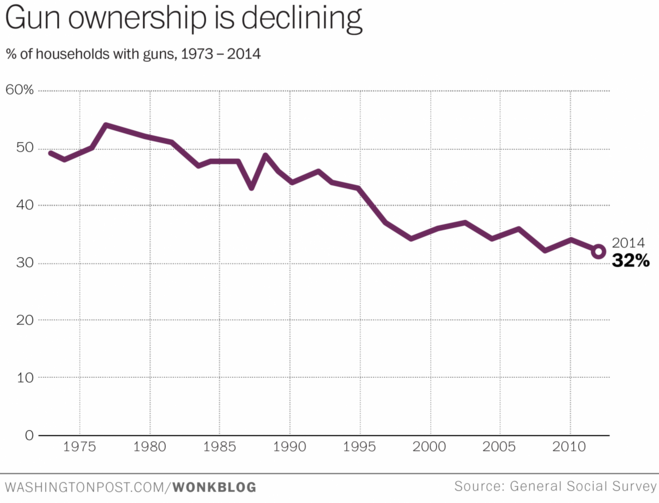The one-gun household is disappearing from American life, along with one-car garages, single-family homes with single family bathrooms, and other bygone markers of the middle class. That seems to be the best explanation for polling data showing that the percentage of homes with guns has dropped significantly even as the sale of guns creeps ever higher.
The Washington Post’s Christopher Ingraham (“America Has More Guns in Fewer Hands Than Ever Before”) looks at the numbers from the General Social Survey: “In 2014, guns were present in fewer than a third of U.S. households—32 percent—according to the survey. That’s 22 percentage points lower than the high of 54 percent recorded in 1977. So this raises a question: where are all those newly manufactured guns going?”
Ingraham concludes that many gun owners are stockpiling weapons, even as more Americans decide that having a firearm in the house is not worth the increased chances of suicides, accidents, and fatal shootings of people who choose the wrong doorbell to ring when they get lost. The other possibility, presumably favored by the National Rifle Association, is that gun owners have signed a blood oath not to answer questions from pollsters or Census takers.
As with so many things in this polarized age, gun ownership seems to track with party affiliation. A Pew Research Center survey from last year concluded, “Republicans are twice as likely as Democrats to be members of a gun-owning household,” by a margin of 49-22. (The survey also found that non-Hispanic whites are twice as likely as blacks and Hispanics to live in homes with guns; the same ratio applies to rural versus urban residents.) So are demographic trends working against the NRA?
Maybe not. Ingraham points to another Pew survey from last year suggesting that gun control has become less popular, even after the massacre at the Newtown elementary school in December 2012: “For the first time in more than two decades of Pew Research Center surveys, there is more support for gun rights than gun control. Currently, 52% say it is more important to protect the right of Americans to own guns, while 46% say it is more important to control gun ownership.”
One explanation is that thoughts are more important than actions in our highly partisan atmosphere. Pew found that 76 percent of Republicans say it is more important to protect the right to own guns (compared with 28 percent of Democrats), even though Pew’s other survey found that a bit less than half of all Republicans live in households with guns. Many Republicans without guns, in other words, still identify with their party’s absolutist stand on the Second Amendment. Is support for gun ownership a litmus test similar to that of skepticism toward global warming?
A libertarian streak among younger voters may also be a factor. Pew statistics show that only 26 percent of young adults (ages 18 to 29) live in households with guns, but 47 percent of the respondents in that age group said protecting gun rights is more important than controlling the spread of firearms.
Or is support for gun control dropping because people think Uzis would be handy to have around after the apocalypse?
YouGov released a survey this week on how Americans view their chances of survival after an “apocalyptic event.” Even on this question, political polarization has the resiliency of a cockroach: “43% of Republicans say that they would survive longer than most people in their community, something only 22% of Democrats say.” There are also partisan differences on the likeliest cause of an apocalypse: 36 percent of Republicans say a nuclear war (vs. 23 percent of Democrats), while 27 percent of Democrats say climate change (vs. 5 percent of Republicans).
A real-time discussion at FiveThirtyEight.com considered the partisan differences, and the possibility that Republicans are more optimistic about survival because they’re more likely to live in rural areas. “Micah” pointed out, “I really think for most apocalypses, living in a city is a huge disadvantage. Nuclear, disease, zombie, resource scarcity.” “Benc” countered, “lots of food and supplies in cities,” but later conceded, “Urban residents actually live longer than rural ones. Granted, that’s at least in large part due to access to health care, which might not fare so well when the doctors are all zombies.”








